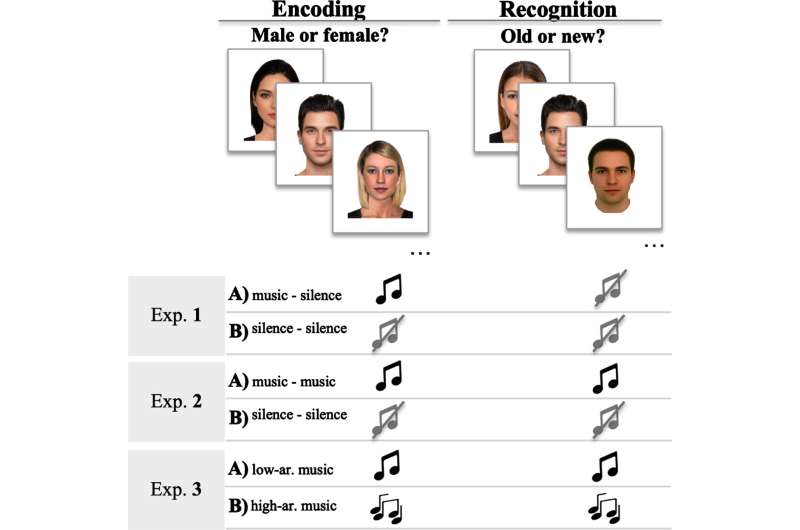This article has been reviewed according to Science X's editorial process and policies. Editors have highlighted the following attributes while ensuring the content's credibility:
fact-checked
peer-reviewed publication
proofread
The beneficial effects of music on memory may depend on how it is listened to

Given the lack of effective treatments to counteract cognitive impairment, background music has traditionally been proposed as a possible therapeutic alternative for improving memory-related tasks. Its effect has long been the focus of debate, but this relationship has now been found to be possibly determined by new interindividual parameters, which means that it may be more complex than was previously thought.
This is shown by research led by Marco Calabria, a researcher in the Cognitive Neurolab group of the Faculty of Health Sciences at the Universitat Oberta de Catalunya (UOC), who is now considering new experiments.
The initial results of the Mozart effect and memory in patients with cognitive impairment (MEM-COG) study suggest that listening to background classical music while performing memory tasks neither improves nor impairs learning levels among people with mild cognitive impairment (MCI). However, listening to more "high-arousal" music was found to have a possible positive effect on people who are accustomed to using music as an emotional regulator in their everyday lives, which suggests there is potential for further hypotheses and research.
The study, which has been published as open access in the Journal of Alzheimer's Disease, was carried out with patients at the neuropsychology unit of Barcelona's Hospital de Sant Pau, and involved researchers at the hospital, Montreal's Concordia University and Madrid's Gregorio Marañón Health Research Institute.
No universal effect
"We found no general impact concerning the effect of music in terms of whether it had positive or negative effects on learning in cases of MCI, but we did find that it would be modulated for each individual. If people regularly use music as an emotional regulator in their daily life, such as to help them remain calm or for company, they will find it easier to obtain further benefits from music when they have to learn something new," explained Calabria, who has a Ph.D. in Psychobiology.
The subjects of the study were people with mild amnestic cognitive impairment, i.e., they have memory problems as a result of an onset of neurodegeneration that is more specific in the parts of the brain dealing with aspects of learning and memory. The experiments consisted of observing 24 photographs of human faces. Participants were instructed to memorize them, and 10 minutes later, they were asked to look at a new series containing the previous 24 images and 24 new ones, in order to attempt to identify the ones that they had already seen.
A classical choice
The first test was performed with the subjects listening to classical music in the information consolidation phase but not in the recovery phase, while in the second exercise it was repeated with the auditory stimulus during both phases. However, no significant differences were observed in terms of results.
Classical music was used in these exercises because "it's a type of music that falls between relaxing and arousing, and has proven to be the most effective for enhancing memory." Furthermore, the fact that it is instrumental reduces the interference (that can come from lyrics) with the content that the participants have to learn in the memory task.
However, Calabria's team wanted to carry out a third experiment using popular music which was considered arousing rather than relaxing, and after a preliminary study, they used an instrumental version of Un rayo de sol (A ray of light), by the group Los Diablos. In that experiment, according to Calabria, the results suggested that "the use of music as a strategy for mood regulation is associated with better performance in memory tasks."
More information: Marco Calabria et al, Background Music and Memory in Mild Cognitive Impairment: The Role of Interindividual Differences, Journal of Alzheimer's Disease (2023). DOI: 10.3233/JAD-221051




















